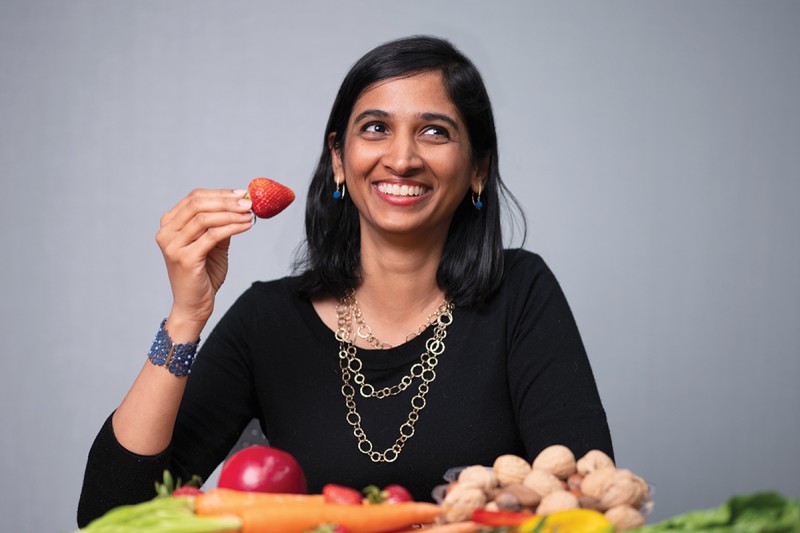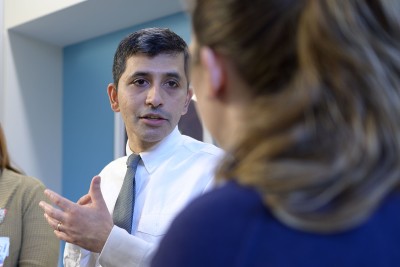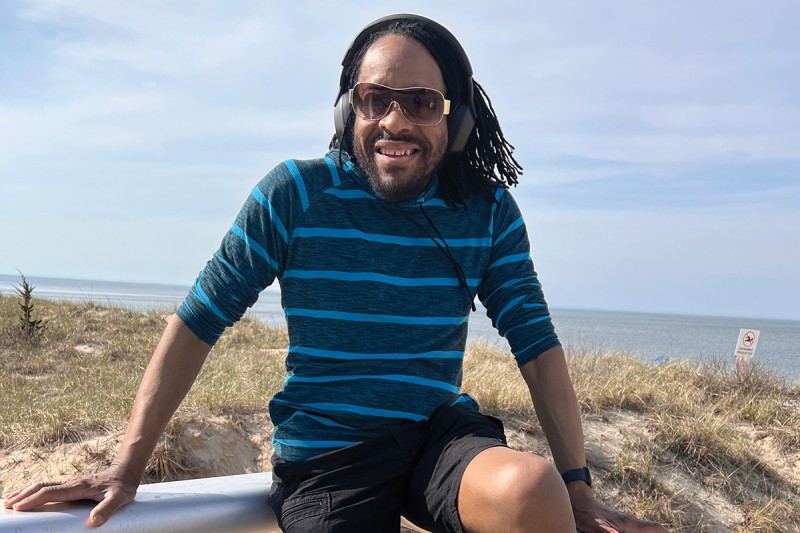
“Patients really want to feel empowered to do something for their own health,” says Dr. Urvi Shah.
By Matt Tontonoz
When Urvi Shah, MD, was diagnosed with Hodgkin lymphoma in 2016 during her first year as a hematology-oncology fellow, she heard lots of recommendations from friends and family about what she should and shouldn’t eat. She thought, as a doctor who was training to treat people with cancer, she should already know what diet was best. But as it turned out, she didn’t.
“I realized that we don’t really get taught any of this in medical school,” Dr. Shah says. “But as a patient, I realized it was a natural question. Patients really want to feel empowered to do something for their own health.”
That’s when she started to read more about the topic of diet, almost as a side hobby. She learned it was common for oncologists to tell their patients to eat whatever they want. The idea seemed to be that cancer treatment is hard enough, so why not? Maybe that argument made sense in an era when chemotherapy, which can cause nausea and vomiting, was the mainstay of treatment. But these days, new therapies are better tolerated.
“Now what complicates treatment more often are the patients’ other health issues, such as diabetes, obesity, cardiovascular disease, and kidney disease,” she says.
Therefore, treatment plans should focus on lifestyle factors patients can control, like diet.
“Other specialties, like cardiology and endocrinology, already have well-established dietary guidelines to accompany treatment,” Dr. Shah says. “So why were we so behind in oncology?”
She was determined to find out.
Shifting Her Focus to Cancer Diets
When Dr. Shah started as a faculty member at Memorial Sloan Kettering Cancer Center (MSK), she initially planned to focus her research on immunotherapy. But her experience being a patient with cancer led her down a different path.
“I said to my Service Chief in 2019 that I would like to conduct a pilot study on diet and see how that goes,” Dr. Shah says. “And then one study led to the next, and to the next. And soon, it became my full-time research focus.”
Dr. Shah now has four ongoing dietary interventional trials. She says they would not have been possible without the extensive research trial infrastructure and robust core facilities to study patient samples at MSK, as well as the scientific expertise and support of Marcel van den Brink, MD, PhD; Alexander Lesokhin, MD; Saad Usmani, MD; Neil Iyengar, MD; Jun Mao, MD, MSCE; and Sergio Giralt, MD, among many others at MSK.
Partly because of her training, and partly because of her own bout with cancer, Dr. Shah is particularly interested in developing dietary guidelines for cancer, especially hematological malignancies, like leukemia, lymphoma, and multiple myeloma.
Can Diet Prevent MGUS or Smoldering Myeloma From Progressing to Multiple Myeloma?
It was just a few years ago that Dr. Shah started her first study, a small clinical trial (research study) of 20 people. Each participant had a precursor condition, which is considered a precancerous state that may or may not progress to full-blown cancer.
A cancer of plasma cells (a type of white blood cells) called multiple myeloma usually arises from precursor conditions called monoclonal gammopathy of undetermined significance (MGUS) and smoldering myeloma (meaning it has no symptoms).
Multiple myeloma is one of 13 cancers that is associated with obesity. Recent studies have shown that people with these precursor conditions who also have an elevated body mass index (BMI) are twice as likely as people with these conditions who have a normal BMI to progress to multiple myeloma.
That observation provided Dr. Shah with the rationale to conduct her study. “We wanted to enroll patients with an elevated BMI, help them lose weight with healthy plant-based foods, and see if that made any difference to the blood markers by which we measure their precursor conditions.”
So she partnered with a company called Plantable that provides nutritional coaching as well as chef-prepared, plant-based entrées mailed right to your door. While on the trial, participants could eat as much as they wanted, as long as it was whole plant-based foods such as fruits, vegetables, nuts, seeds, whole grains, and legumes. The idea was that because plant-based foods are higher in fiber, people would feel fuller faster and would end up consuming fewer calories overall, while still benefiting from the high-nutrient density of plant-based foods.
But would it work?
One Patient’s Cancer Diagnosis and Dramatic Turnaround
Will Wright’s troubles began in 2010. He was on his way from Long Island, where he lives, to Rockefeller Center, where he had worked for more than a decade as a news manager for NBC Universal and MSNBC. That June morning, he stepped off the train, then began the three-flight walk up the steps to the street. When he reached the top, he fainted.
“That was pretty dramatic because I had experienced weakness before, but I had never gotten to the point where I actually collapsed,” Will says.
A series of tests revealed he had cancer — in two places.
“In the same week, I was diagnosed with having both prostate cancer and kidney cancer. Plus, I was anemic for some reason,” Will says. “It looked pretty bleak.”

Dr. Sham Mailankody specializes in treating blood disorders.
Surgeons at MSK first removed part of his kidney and then his prostate. Still, the anemia didn’t go away. That’s when he went to see MSK oncologist Sham Mailankody, MD, who specializes in blood disorders. In 2016, Dr. Mailankody diagnosed Will with MGUS.
“That was depressing because I had just gotten rid of two cancers and here I was staring down another one,” Will says.
But Dr. Mailankody had some encouraging news. As he explained to Will, MGUS is the kind of disorder that if the blood markers stay under control, you can die with it, not from it.
But how is it possible to keep MGUS under control?
As it happens, Dr. Shah was working on that very question. Will started seeing Dr. Shah in mid-2019, for monitoring of his MGUS. He was a Type 2 diabetic who was overweight and had been on insulin for 30 years. Dr. Shah thought that Will might be the perfect person to participate in her first pilot study of a vegan diet — one of only 20 people.
“I can tell you right up front, being a child of the South and from a family who believed in Southern cooking with all its richness and cholesterol and fat, I didn’t think for a second that I would spend any serious time being vegan,” Will admits. But, he followed the rules religiously.
The results were dramatic. The trial itself lasted a year. One month in, Will no longer needed insulin. He was no longer diabetic. His vision improved. Even his hair seemed to grow faster.
Now, nearly two years since the start of the trial, he’s down 65 pounds and feels like a new man. To his great surprise, he even likes being vegan. “I have learned to cook phenomenal Thai food that my wife savors,” he says.
Most important, his MGUS markers, which had been rising steadily for the past six years, have plateaued — a possible indication that the progression of his MGUS has been halted.
‘I’m Into the Light’
Will’s case is far from the only success story from that first trial. On average, patients lost about 8% of their body weight after 12 weeks of being on the study, Dr. Shah says. And many have experienced other benefits as well. A participant with depression was able to stop taking anti-depressants because their mental health improved while on the plant-based diet.
Those encouraging results led Dr. Shah to conduct additional, larger studies. The one she has open now is a large, multicenter study for 150 patients called NUTRIVENTION-3. In 2023, the American Society of Hematology bestowed upon her a prestigious ASH Scholar Award for her work on this study.
Does Dr. Shah practice what she preaches? “I do,” she says. “I follow what I tell patients. I do exactly this.”
Perhaps that’s why her patients trust and admire her so much.
“If I had another daughter, I would want her to be like Dr. Shah,” Will says. “It looked pretty dark back in 2010. Thanks to Dr. Shah, I’m into the light.”

